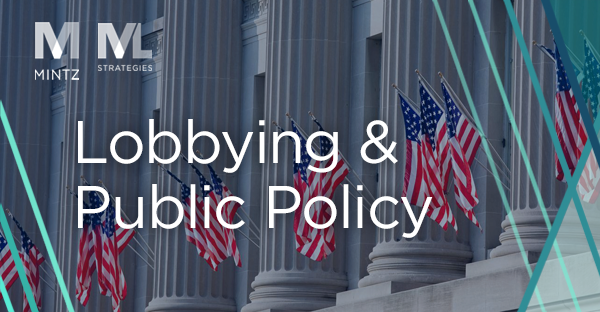
Energy & Sustainability
Viewpoints
Filter by:
Energy & Sustainability Washington Updates – March 2021
March 2, 2021 | Blog | By R. Neal Martin
As Walsh Awaits Confirmation Vote, DOL Priorities Take Shape
February 16, 2021 | Blog | By Anthony DeMaio, R. Neal Martin
Last week, the Senate Committee on Health, Education, Labor, and Pensions voted 18-4 to advance Boston Mayor Marty Walsh’s nomination for labor secretary. The bipartisan approval signals a non-controversial confirmation vote of the full Senate. When that occurs, Secretary-designate Walsh will take over a department that is front and center in the nascent Biden administration. Executing White House priorities including the federal response to the COVID-19 pandemic, addressing the climate crisis, and reversing certain Trump era actions, will soon be Walsh’s responsibility. His experience in Massachusetts politics gives a sense of how Walsh will approach his new post.
Read more
DC Circuit Vacates Trump Administration’s Affordable Clean Energy Rule
February 3, 2021 | Blog | By Garrett Galvin
On January 19, 2021 the United States Court of Appeals for the District of Columbia Circuit (the “DC Circuit”) vacated the Affordable Clean Energy Rule (the “ACE Rule”), a policy instituted by the Environmental Protection Agency (the “EPA”) on June 19, 2019 that weakened emissions standards for power plants and empowered states to set their own energy standards.
Read more
Highlights of the Section 45Q Final Regulations
January 29, 2021 | Blog
Energy & Sustainability: What to Expect from the 117th Congress and the Biden Administration
January 15, 2021 | Blog | By R. Neal Martin
After what felt like one of the longest election seasons in history, Washington is preparing to welcome the incoming administration of President-elect Joe Biden and Vice President-elect Kamala Harris. Meanwhile, Capitol Hill adjusts to a dramatic shift in power as Democrats achieved an election night stunner by winning both Senate run-off elections in Georgia on January 5, sending Rev. Raphael Warnock and Jon Ossoff to Washington and giving Democrats a 50-seat majority with the new incoming vice president casting any tie votes. In the House of Representatives, Republicans narrowed the Democrats’ majority in November but are still in the minority and Rep. Nancy Pelosi (D-CA) has been reelected to serve as Speaker of the House.
Read more
During Biden Administration, SEC will require Climate Change Risk and ESG Disclosure
December 29, 2020 | Blog
Public companies will be required to disclose climate risks and greenhouse gas emissions under President-elect Biden’s administration. The Securities and Exchange Commission (SEC) will institute rulemaking and guidance on the federal monitoring of environmental, social and governance (ESG) issues.
Read more
Renewables Tax Extenders Passed by Congress
December 22, 2020 | Blog
Late on December 21, 2020, the Senate debated and approved a COVID-19 relief package and omnibus spending bill for 2021 that included, deep in its 5,500-plus pages, tax extenders for a selection of renewables tax credits, including a one-year extension for the wind production tax credit ("ITC") and a two-year extension for the solar investment tax credit ("ITC"), as well as a five-year extension for offshore wind projects taking the ITC. The bill, which was earlier approved by the House, is expected to be signed by President Trump later this week.
Read more
USCIT Ruling Permits Implementation of Trump Administration’s Bifacial Solar Tariffs
November 30, 2020 | Blog | By Garrett Galvin
In a slip opinion issued on November 19, 2020, the United States Court of International Trade (“USCIT”) permitted the imposition of tariffs on bifacial solar panels, a victory for the Trump administration’s years-long effort to limit imports of foreign-made solar technologies.
Read more
FERC Order Removes Barriers for Distributed Energy Resource Aggregations in Wholesale Markets
September 30, 2020 | Blog | By Garrett Galvin
On September 17, 2020, the Federal Energy Regulatory Commission issued Order No. 2222 to allow for the greater participation of distributed energy resource aggregations in organized wholesale markets. The long-awaited rule is aimed at increasing competition in electric markets, enhancing grid flexibility and reliability, and leveling the playing field when it comes to organized capacity, energy, and ancillary services run by regional grid operators.
Read more
Massachusetts Department of Energy Finalizes Solar Incentive Program
August 31, 2020 | Blog | By Kati P. Strzelczyk
This past July, the Massachusetts Department of Energy Resources (DOER) announced a final set of regulations for the Solar Massachusetts Renewable Target program (SMART). Such regulations are intended to promote cost-effective solar development throughout Massachusetts.
Read more
Trends in COVID-Era Renewables Tax Credit Proposals
August 21, 2020 | Blog
This article summarizes the most recent pandemic-era proposals for wind, solar, and carbon capture federal tax incentives and attempts to discern potential trends for the future.
Read more
In February 2020, the IRS issued Notice 2020-12, which provides long-awaited guidance on when a “qualified facility” or carbon capture equipment, in each case within the meaning of section 45Q, is considered to have “begun construction.” This question is of paramount significance because section 45Q allows a carbon capture credit for carbon oxide that is captured using carbon capture equipment that is originally placed in service at a qualified facility, and a qualified facility means an industrial or direct air capture facility, the construction of which began before January 1, 2024.
Read more
Artificial Intelligence and Satellite Technology to Enhance Carbon Tracking Measures
July 29, 2020 | Blog
New carbon emission tracking technology will quantify emissions of greenhouse gas, holding the energy industry accountable for its CO2 output. Backed by Google, this cutting-edge initiative will be known as Climate TRACE (Tracking Real-Time Atmospheric Carbon Emissions).
Read more
Democrats Lay Groundwork for Infrastructure & Clean Energy Ahead of General Election
July 20, 2020 | Blog | By Thomas Burton, R. Neal Martin
Petition Seeks Federal Overturn of Net Metering, Calls into Question Federal vs. State Authority Over Solar Sales
July 8, 2020 | Blog | By Garrett Galvin
A petition filed in April by the New England Ratepayers Association (NERA) has requested that the Federal Energy Regulatory Commission (FERC) reassess its authority over retail solar sales, stating that the federal government, through FERC, not individual state legislatures and public utility commissions, has exclusive jurisdiction over wholesale energy sales and should end the practice of net metering.
Read more
Investor Advisory Committee Pushes SEC to Lead on ESG Disclosures
June 1, 2020 | Blog | By Sahir Surmeli, Thomas R. Burton, III
The U.S. Securities and Exchange Commission’s Investor Advisory Committee’s Investor-as-Owner Subcommittee recently voted 14-4 to approve a recommendation that urges the Commission (SEC) to begin an effort to update the reporting requirements of public companies to include material, decision-useful environmental, social, and governance (ESG) factors.
Read more
Explore Other Viewpoints:
- Antitrust
- Appellate
- Arbitration, Mediation & Alternate Dispute Resolution
- Artificial Intelligence
- Awards
- Bankruptcy & Restructuring
- California Land Use
- Class Action
- Complex Commercial Litigation
- Construction
- Consumer Product Safety
- Cross-Border Asset Recovery
- Debt Financing
- Direct Investing (M&A)
- Diversity
- EB-5 Financing
- Education & Nonprofits
- Employment
- Energy & Sustainability
- Environmental Enforcement Defense
- Environmental Law
- FDA Regulatory
- Federal Circuit Appeals
- Financial Institution Litigation
- Government Law
- Growth Equity
- Health Care
- Health Care Compliance, Fraud and Abuse, & Regulatory Counseling
- Health Care Enforcement & Investigations
- Health Care Transactions
- Health Information Privacy & Security
- IP Due Diligence
- IPRs & Other Post Grant Proceedings
- Immigration
- Insolvency & Creditor Rights Litigation
- Institutional Investor Class Action Recovery
- Insurance & Financial Services
- Insurance Consulting & Risk Management
- Insurance and Reinsurance Problem-Solving & Dispute Resolution
- Intellectual Property
- Investment Funds
- Israel
- Licensing & Technology Transactions
- Life Sciences
- Litigation & Investigations
- M&A Litigation
- ML Strategies
- Medicare, Medicaid and Commercial Coverage & Reimbursement
- Mergers & Acquisitions
- Patent Litigation
- Patent Prosecution & Strategic Counseling
- Pharmacy Benefits and PBM Contracting
- Portfolio Companies
- Privacy & Cybersecurity
- Private Client
- Private Equity
- Pro Bono
- Products Liability & Complex Tort
- Projects & Infrastructure
- Public Finance
- Real Estate Litigation
- Real Estate Transactions
- Real Estate, Construction & Infrastructure
- Retail & Consumer Products
- Securities & Capital Markets
- Securities Litigation
- Special Purpose Acquisition Company (SPACs)
- Sports & Entertainment
- Strategic IP Monetization & Licensing
- Tax
- Technology
- Technology, Communications & Media
- Technology, Communications & Media Litigation
- Trade Secrets
- Trademark & Copyright
- Trademark Litigation
- Venture Capital & Emerging Companies
- White Collar Defense & Government Investigations
- Women's Health and Technology





